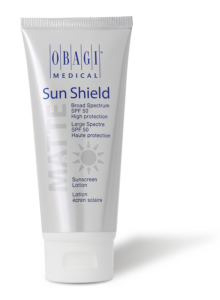Skin Protection Solutions for Skin Cancer Awareness Month
May 24, 2023
May is Skin Cancer Awareness Month, which is the perfect time to evaluate your approach to skin protection and make sure you are prepared for the summer months ahead. Many of us will spend our summers at the beach, enjoying the sun, the fireworks, and the many benefits that being outdoors provides us with. But it’s not all fun in the sun. It’s important to recognize the risks posed from sun exposure to our skin—particularly the delicate skin surrounding your eyes—and protect ourselves.
What is skin cancer?
Skin cancer is considered the most common type of cancer worldwide, affecting nearly one in five Americans. And while there are other things that cause skin cancer, the leading cause is excessive exposure to the harmful UV rays of the sun. Periocular skin cancer, something our oculoplastic surgeons often treat, is skin cancer that specifically affects the skin surrounding the eyes. This particular type of skin cancer can be extremely dangerous due to its proximity to the eye.
The most common types of periocular cancer are basal cell carcinoma and squamous cell carcinoma. Basal cell carcinomas (BCCs) and squamous cell carcinomas rarely spread to other parts of the body but, if left untreated can grow large enough to deform the eye and disrupt your vision.
Melanomas, while less common, are much more serious and can occur on or in the eye. Another form of periocular cancer occurs in the oil glands surrounding the eyes. This specific form of cancer—sebaceous gland carcinoma—is a very rare form of periocular cancer.
Who is at risk?
Anyone can develop skin cancer, although some individuals are at a higher risk than others. Those with less melanin in their skin, such as those with fair skin and light-colored hair, tend to be more susceptible to sunburn, and multiple sunburns greatly increase one’s chances of developing skin cancer. Individuals with a tendency to have many freckles or moles are also at a higher risk. Other factors such as a family history of skin cancer or weakened immune systems can also play a role in whether you are at risk or not.
Signs and symptoms to look out for
As with many other diseases, early detection and treatment is key. Some things to look out for include unusual moles or changes in your skin. Periocular skin cancer can also present itself as a sore that won’t heal, a painless nodule, or persistent eyelid inflammation, and it’s common for there to be bleeding, crusting or ulcerations near the eye. If you notice any irregularities in the skin surrounding your eye or a particular mole, schedule an appointment with your doctor immediately to monitor any changes.
Treating periocular cancer
The most effective way to reduce the spread of periocular skin cancer is immediate and thorough removal through surgery. Surgery to remove periocular skin cancer includes excision and the use of a microscope to remove cells layer by layer until no signs of cancer remain. Once all signs of cancer have been removed, your surgeon repairs and reconstructs the area through the use of sutures, flaps, or skin grafts. Our board-certified oculoplastic surgeons at Wilmington Eye are highly skilled in the removal of cancerous cells around the eyes while maintaining and restoring the structure of the delicate eye area. 
Protect yourself from periocular skin cancer (and other forms of skin cancer)
Now for the good news! You can still enjoy the outdoors without increasing your risk of skin cancer.
Reducing your exposure to UV rays can be done by using sunscreen, seeking shade, and covering up with loose, long-sleeved clothes and wide-brimmed hats. And don’t forget sunglasses – they protect both your eyes and the delicate area around your eyes, which may help reduce development of periocular cancer and cataracts.
 Sunscreen is an extremely important method of sun protection, as it filters out UV rays. It also helps protect hard-to-cover areas like the back of your neck, shoulders, tips of the ears, hands, and the delicate skin surrounding your eyes. Our oculoplastic surgeons’ favorite SPF solution is Obagi Sun Shield SPF 50, which combines UVB and UVA protection in an elegant, matte finish. Sun Shield is both non-comedogenic and dermatologist tested. Sun Shield is available for purchase at our main location on New Hanover Medical Park Drive and Wilmington Eye’s Oculoplastic Center, no prescription needed.
Sunscreen is an extremely important method of sun protection, as it filters out UV rays. It also helps protect hard-to-cover areas like the back of your neck, shoulders, tips of the ears, hands, and the delicate skin surrounding your eyes. Our oculoplastic surgeons’ favorite SPF solution is Obagi Sun Shield SPF 50, which combines UVB and UVA protection in an elegant, matte finish. Sun Shield is both non-comedogenic and dermatologist tested. Sun Shield is available for purchase at our main location on New Hanover Medical Park Drive and Wilmington Eye’s Oculoplastic Center, no prescription needed.
To learn more about purchasing skincare products from Wilmington Eye or the treatment of periocular cancer, contact us today.